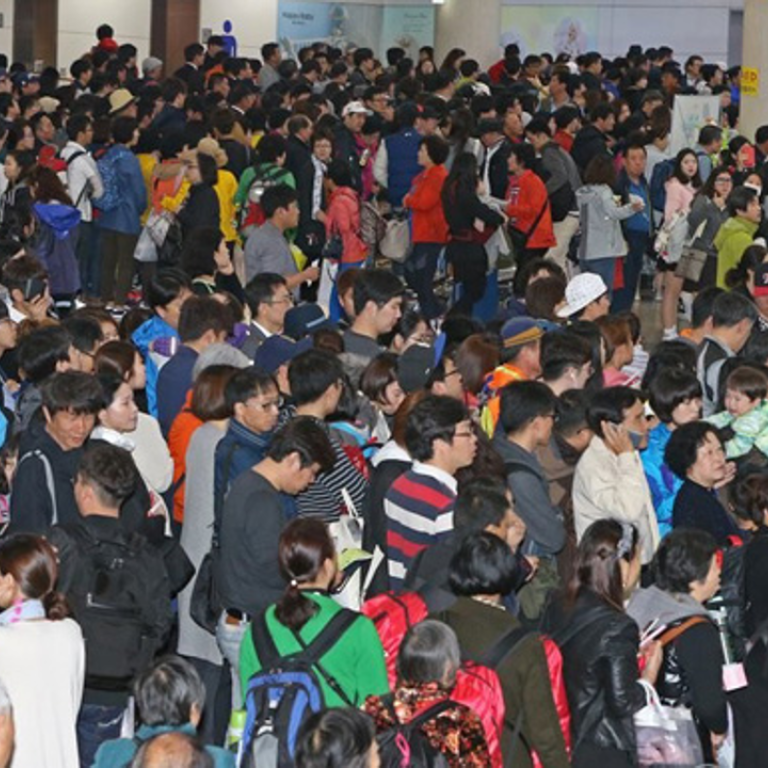
South Korea’s Jeju Island suffers from ‘too many tourists’
Residents complain about the excessive number of visitors and oppose a new airport
By Jung Min-ho
Every year, about 15 million tourists visit Jeju Island, home to only 660,000 people.
Over the past decade, the island has turned into Korea’s tourism hub with many luxury hotels and resorts, thanks to an increasing number of visitors from overseas and other parts of the country.
But the island’s commercial success has come at a steep cost. An overwhelming amount of garbage and noise has become a part of Jeju life. Traffic jams have become more common. Jeju’s underground water has recently been found to be “in danger of being exhausted.”
Now, the government is planning to build a new airport in southern Jeju, which it thinks will triple the number of tourists to 45 million by 2035.
Since the government announced the plan two years ago, thousands of Jeju residents have opposed it, saying their island is already suffering from an overwhelming number of tourists and more visitors will destroy the beauty that attracted them in the first place.
“We are opposed to the plan for the future of Jeju Island, which is now at stake,” Kang Won-bo, director of the protesters’ group, told The Korea Times. “Its once-pristine environment has been seriously damaged after it became popular with outsiders. There is more trash and traffic jams.”
“In addition to such obvious harm, Jeju residents have to deal with the stress from many people and noise, which is everywhere. Many miss how it used to be.”
According to Kang, many Jeju residents were “glad” when the Chinese government banned the sale of group tour packages to Korea last year following the deployment of a U.S. anti-missile system here.
Over the past few months, protesters’ have raised their voices against the airport plan, holding rallies across the island and in Seoul.
Faced with the fierce opposition, the Ministry of Land, Infrastructure and Transport suspended the plan and said it will re-examine Jeju’s Seogwipo to determine whether the city is a proper site for airport construction.
One of the biggest misconceptions about Jeju’s tourism boom is that it earns Jeju residents a lot of money, Kang said.
“Many commercial facilities on the island are owned by foreigners or major companies. They make a lot of money, while many of Jeju’s small business owners make only a fraction of the money tourists spend here,” he said.
For example, many Chinese tourists, which account for 80 per cent of all foreign visitors to Jeju, come to the island in groups through Chinese travel agencies and eat in the restaurants owned by Chinese residents.
“Jeju natives complain that they have been forced out of businesses because of foreigners and major hotel chains. Meanwhile, they all share the cost of mass tourism. I think that’s unfair,” Kang said.
Protesters have also accused the ministry of failing to communicate with them from the beginning.
The ministry denied the allegation, saying it collected their opinions and communicated with them through several briefing sessions before the project announcement.
The ministry also said Jeju International Airport is already too crowded and, as demand will continue to increase, safety risks will rise too. According to estimates, the number of current users is 30 million, which is 4 million more than it was designed to handle.
“Due to an increasing number of aircraft at the airport, a plane crash could have happened September 29,” the ministry said. “To ensure safety and convenience for users, building another airport is essential.”
The ministry said it is open to dialogue with Jeju residents. But if the opposition continues even after objective examinations and discussions, the ministry said it will take the issue to court.
When it comes to the issue of mass tourism, Jeju is hardly alone. Around the world, famous places such as Venice and Barcelona are also suffering from a massive influx of visitors.

